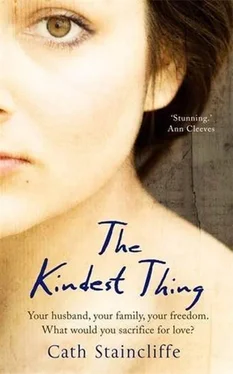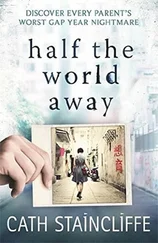‘All right.’
‘It won’t be easy. And it means you have to answer the same to everything they ask. Some of the questions will be trivial or mundane or obvious, but you still offer no comment. It will feel like a weakness, it will make you feel pathetic’ She looks up at me from under her eyelids, pressing the message home. ‘Everybody feels like that. But you just persist. The police will be all sweet reason and they will make you feel ridiculous. They bank on that. And they will try to come between us. They might say I’m giving you poor advice, encouraging you to waste their time. Don’t rise to the bait. You’re recently bereaved so they know they must tread gently, but it will still feel horrible. Okay?’
Oh, fine and fucking dandy.
‘I want to rehearse with you,’ she adds.
I stare at her.
‘The no-comments. It helps to try it out before you go in.’
She asks the questions and an edge of hysteria creeps up on me as I repeat, ‘No comment,’ each time. What if I laugh? Cackling inappropriately like some picture-book witch, that’d look really good, wouldn’t it?
‘Deborah?’
‘Sorry, I drifted off.’
‘You sure you feel up to this? I can ask for a few days’ grace. It’s just over two weeks since your husband died – we could raise that as an objection, that you’re not fit for interview.’
‘No, no, I’m fine.’ Why am I so keen to have the interview? I think because it seems the quickest way to get out of the place, to be freed from the confines of the cell and the awful isolation. I will say my no-comments and they will let me go.
‘Have you spoken to your children? Do you need to call anyone?’
I picture Sophie coming in from school, flushed with the heat, slinging her heavy bag down in the hall, drinking a glass of water, Adam peering into the fridge. ‘No, I left a note. I don’t want to worry them.’
‘They may detain you overnight. They’d have to arrest you first but then you can be held for twenty-four hours.’
Shit. I cover my face with my hands. They are cool, though they feel grimy. If I were at home, I could take a shower, stretch out on our bed (new mattress in case you’re wondering. Will that be held against me?) and let the afternoon unspool. Or sit in my workshop and gaze at the bees and the blue tits and the cabbage whites. Let their droning and swooping and flickering fill my mind.
‘Don’t worry about that yet,’ she adds, but now she has warned me I feel it’s bound to happen.
‘I’ll tell them we’ll be ready in, say, fifteen minutes. I’ll sort out a drink. Tea, coffee?’
I sit up straight, my back rigid like a slab, and take a deep breath, but the air is dry and stale and brings no succour.
The interview takes place in a small, bland room with oatmeal-coloured walls, heavy-duty ribbed grey carpet and recessed halogen lighting – it could be in a hospital or a school, the same anonymity. The light is garish and makes us all look washed out.
The detective, DS Bray, explains the protocol for the session. He makes eye contact a lot and has an easy, confident manner. A little like Neil, in fact, though nowhere near as beautiful. This is how Neil would be when he gave his students’ reports at parents’ evening – friendly and open and a pleasure to talk to. The police say they will record my interview on video. The camera is already running. He reads the caution, the one from all the telly programmes, and asks if I understand it.
He begins commiserating with me on Neil’s death, he understands what a difficult time it must be, sorry to intrude, but they would really like to hear my account of that day. Perhaps if I start from the evening before? How was Neil then?
I hesitate. ‘No comment.’ My voice sounds hollow. He’s not put off by this: he must have been expecting it, though his colleague, a scratchy-looking man with dry skin, rolls back his shoulders, betraying irritation.
‘Your husband Neil was suffering from motor neurone disease?’
‘No comment.’
‘How long since his diagnosis?’
A year and nine months. ‘No comment.’
‘How long had you been married?’
Had, as though the marriage ended with Neil’s death. We still are, I want to tell him. If Neil had lived we would have reached twenty-four years this September. Twenty-four years and he’s still my husband. I long to tell the man that, to prove the longevity of our relationship. ‘No comment.’
Ms Gleason said it would be hard but there is worse to come. ‘Was it a happy marriage?’
My throat swells. ‘No comment.’
‘You cared for him as his health declined.’
‘No comment.’
‘Was he on any medication?’
‘No comment.’
‘How was he that morning?’
‘No comment.’
‘Could he work?’
Neil, his lovely long legs, they could no longer bear his weight. He’d been so tall and strong, able to carry me. I’d revelled in his strength. My voice falters: ‘No comment.’
‘You have a son – Adam?’
‘No comment.’
He makes me negate everything about my life. I hate him for it. And I feel craven. Unable to own the circumstances of who I am, what I am. His tone is measured and warm, but the process is brutal. Each question is a blow disguised as a caress.
‘And a daughter, Sophie?’
Oh, Sophie, Sophie. My lovely girl. I should have cuddled her this morning – even if she didn’t want to talk surely a hug would have helped. A pause, my mouth waters and my eyes sting. I can feel the pressure as the tip of my nose reddens. I swallow hard.
‘This isn’t really helping us, Deborah.’ He is a sensible parent, a concerned form tutor. With ghastly inappropriateness I remember a joke Jane told me. About the inflatable boy who sticks a drawing pin in his foot and is called to see the headmaster. ‘You’ve let us all down,’ the head tells him, ‘you’ve let me down, you’ve let the school down and most of all you’ve let yourself down.’
I blurt out a noise, a laugh or a sob. It doesn’t matter, does it?
‘If we can just hear your account of what happened to Neil it might help answer some of the inconsistencies we’ve come across. We’re as eager as you are to see this sorted out.’
My solicitor chips in – can she smell me weakening? ‘My client does not want to comment.’
‘You said previously that you discovered your husband at three o’clock and couldn’t rouse him. Is that correct?’
‘No comment.’
How does he know this? Then I remember the comic-book-hero policeman, with the wide jaw and narrow forehead, who called while the ambulance was there, making notes at our kitchen table. What else did I say?
‘No comment.’
‘Did you give your husband any medication of any sort that day?’
‘No comment.’
‘Was he in pain?’
I don’t like to think of Neil in pain. And it didn’t often happen. The muscles became progressively weaker, turning from sinew to sponge as they lost the capacity to communicate with the brain. The pain wasn’t physical.
‘No comment,’ I say tightly.
He takes a sip of water from the cup at his side. He’s left-handed; he wears a plain gold band on his ring finger.
‘I don’t know whether your solicitor has explained to you how a jury might interpret your choice to remain silent.’
The word ‘jury’ sends my blood pressure sky high, a tightening of my skin, my pulse stammering. I want to run – I want to hurl my chair aside and fling open the door and pelt down the street, through the park, across the main road, on and on, away. Find somewhere safe, somewhere for Neil and me, where nobody can bother us.
Ms Gleason jumps in. ‘My client is exercising her right to remain silent under advisement.’
Читать дальше












